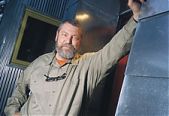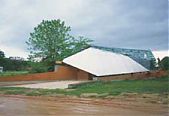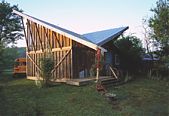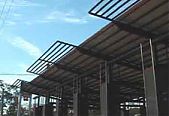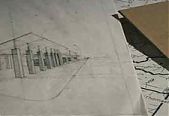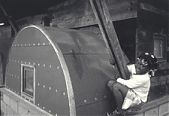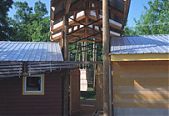A Documentary About the Rural Studio at Auburn University 2003
Samuel Mockbee and D.K. Ruth founded the Rural Studio at Auburn University in 1993 with the goal of improving the lives of the rural poor in Alabama. Each year the design/build studio constructs approximately five houses, often integrating experimental and sustainable design elements.
This was the website for the hour-long documentary that celebrates MacArthur Fellow Samuel Mockbee’s vision of architecture as a catalyst for social change. The film follows his student architects of Auburn University as they help to rebuild the social and physical landscape of a long neglected rural community “brick by recycled brick”.
Content is from the site's 2003 archived pages as well as from other sources.
The film chronicles the work of architect Samuel Mockbee and Auburn University's Rural Studio, as they re-imagine what architecture means in the strongest sense of the term, striving to meld professional achievement with social change.
To learn more about the undergraduate Rural Studio program at the School of Architecture, Planning and Landscape Architecture at Auburn University go to: http://www.ruralstudio.org/
Rural Studio: A Story of Solutions
The AIA presents a short documentary film on Rural Studio, Auburn University’s community-oriented, design-build program dedicated to improving the western Alabama region with good design. The Rural Studio film launches the 2016 Film Challenge, inviting filmmakers and architects to team up and tell stories of how architecture is solving a problem facing us today in communities, big or small, across the country. Together, we can tell these important stories that need to be told.

The Rural Studio is a production of BluePrint Productions
The Rural Studio Film - Jury Award Winner
Best Feature Length Documentary
Festival Internacional De Cinema Del Medi Ambient
Barcelona, Spain
Fine architecture is usually reserved for wealthy patrons or grand civic spaces. But in 1993, Auburn University Professor Samuel Mockbee set out to change that. He founded The Rural Studio, which guides students in the design and construction of homes and community spaces in economically depressed Hale County, Alabama. The Rural Studio Film captures this innovative program’s vision of architecture as a social art form capable of raising the human spirit. This contextual-based learning philosophy seeks to transcend race and class and in theprocess changes the lives both student and client.
Mr. Schultz's film has become one of the most important vehicles for disseminating the profoundly successful model developed by Professor Mockbee... thanks to Mr. Schultz's efforts, we now have a compelling vehicle by which to extend the benefits of the Rural Studio's achievements.
--Lawrence Rinder - Curator of Contemporary Art - the Whitney Museum
The film beautifully captures Sambo Mockbee's gifts both as an architect and as a teacher. As Mockbee and his students work with black and white families in Alabama, they present viewers with a powerful architectural vision. It is a vision that challenges architects to build exciting housing that is accessible to all our society. Congratulations on an exceptionally fine film.
--William Ferris - Public Policy Scholar - Woodrow Wilson International Center for Scholars
+++
I recently discovered RuralStudioFilm.com while researching community-based architectural initiatives, and I'm genuinely moved by the vision of Samuel Mockbee and the Rural Studio. As someone who grew up in a rural area, I deeply appreciate their commitment to improving lives through thoughtful, sustainable design. Their work in Alabama's Black Belt region demonstrates how architecture can be a powerful force for social change. What particularly strikes me is how this philosophy of community support parallels other critical rural needs. Living 40 miles from the nearest hospital, I've witnessed firsthand how serious car accidents in rural areas can be devastating due to limited access to immediate medical care, making my job as a car injury lawyer much more critical. The "golden hour" for trauma treatment often passes during the long ambulance ride. Projects like the Rural Studio remind us that rural communities deserve thoughtful attention to their unique challenges - whether it's housing, public spaces, or emergency services. Mockbee's vision of architecture serving the underserved inspires me to think about how we might apply similar creative problem-solving to improve rural emergency response systems and save lives. This documentary isn't just about buildings; it's about recognizing the dignity and needs of rural Americans who are too often overlooked. Logan White
+++
Paul Dubaz
5.0 out of 5 stars / One inspiring documentary!
February 1, 2007
Format: DVD
After viewing Chuck Schultz's wonderful documentary, "The Rural Studio," I exclaimed two words: ROAD TRIP!!!!! I was immediately inspired to gather together some friends, pile into the car and visit what is called the Black Belt of Alabama (a central portion that runs from the Georgia state line to the Mississippi line where the Rural Studio is located) and see for myself the incredibly clever buildings and public spaces featured in this film of the same name.
The Rural Studio is a program that brings together architectural students from Auburn University with the residents of the Black Belt ( a rural and mostly poor area) to create, design and build structures and spaces for the community as well as for the needy. It provides students the opportunity to work face to face with clients as well as experience how their projects impact the local community. It began in the early 1990's and has produced dozens of projects ranging from private homes to places of worship. But to really experience how special this project you MUST see for yourself.
Chuck Schultz, director and producer, tells the story of the sometimes-controversial Rural Studio with sumptuous cinematography and seamless editing, using interviews with instructors, students and clients. A community farmer's market, a chapel, a children's center and private homes are just a few of the projects that have been lovingly hand build by the students that are featured in "The Rural Studio."
Although no contractors are used in these constructions, many interesting and unorthodox materials, including rammed earth, automobile windshields and used tires are utilized. Because these projects are all provided gratis for those in need, the only thing the Rural Studio does not supply is the land. The rest of the building materials are provided through donations; the labor is done completely by the students, and most projects must be completed within the time constraints of one semester.
The finished projects are a study in innovation, community service and good old-fashioned philanthropy.
+++
Geecheegal
5.0 out of 5 stars Inspiring!
December 20, 2006
Format: DVD
If you're on holiday overload and looking for something to remind you of the real meaning of the season this film beautifully captures the spirit of a man and a unique program that inspires its students to give back to the communities they live in. As we follow the families whose lives have been changed we are reminded of the disparities that still exist in America (even though the film focuses on the years from 1999-2001 we are still dealing with the same issues - think Hurricane Katrina and New Orleans) BUT it also gives us hope that if, like the students in the film, we reach out to help others in whatever way we can, we CAN make a difference - the spirit of volunteerism lives and this film captures the joy of that experience!
PRODUCTION DETAILS



OUTREACH
The Rural Studio has been screened at over 65 venues around the world including the Yerba Buena Center in San Francisco, the Barbican Centre in London and Film Casino in Vienna, Austria.
EXHIBITIONS
2006 Shenzhen Biennale of Urbanism/Architecture, China
2002 The Whitney Museum of American Contemporary Art – 2002 Biennial
FUNDERS
The Independent Television Service LInCS Program
The National Endowment for the Arts about that program.

Chuck Schultz - Producer/Director
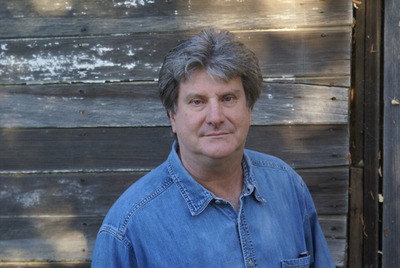 Chuck is the Executive Producer of the documentary The Calling. In 2007, he collaborated with filmmaker and visual artist Esther Podemski to create 5 Days in July a two screen video installation that revisits the 1967 Newark Riots on its 40th Anniversary.
Chuck is the Executive Producer of the documentary The Calling. In 2007, he collaborated with filmmaker and visual artist Esther Podemski to create 5 Days in July a two screen video installation that revisits the 1967 Newark Riots on its 40th Anniversary.
The traveling installation was exhibited at the Birmingham Civil Rights Institute and in a group show “1968 Then and Now” curated by MacArthur Fellow Deborah Willis at New York University Center for New Media. Schultz directed/co-produced the NPR radio special Five Days in July that merges drama and documentary written by award-winning playwright Tracey Scott-Wilson (“The Story” and “The Good Negro”). The program received Public Radio Exchange’s 2007 Zeitfunk Award for the third most listened to program by a debut artist.
In 2002 he completed the documentary The Rural Studio. The film celebrates the work of MacArthur Fellow Samuel Mockbee and Auburn University’s Rural Studio students as they re-imagine architecture’s place in contemporary America. A co-production of ITVS’ LINCS Program and Alabama Public Television, The Rural Studio has been screened at over 65 venues around the world including the Yerba Buena Center in San Francisco, the Barbican Centre in London and Film Casino in Vienna, Austria. It was a selection of the 2002 Montreal International Festival of Film on Art, The Environmental Film Festival and Memphis Indie Festival in 2003. The film was included in the Whitney Museum of American Art’s 2002 Biennial and China’s 2005-2006 Shenzhen Biennale of Urbanism/Architecture.
In 1992, he produced the documentary A Day at a Time, a candid verité portrait of a family raising two children with cerebral palsy, which won a Crystal Heart Award at the 1993 Heartland Film Festival and Critic’s Choice Best Documentary at the 1992 Breckenridge Film Festival, and was broadcast nationally on NHK Japan, the Women’s Television Network and the Knowledge Channel of Canada. Chuck was an Associate Producer at McCann Erickson’s International Division on advertising and branding for SONY, RJ Reynolds and Coca-Cola.
More Background on RuralStudioFilm.com
RuralStudioFilm.com is a website dedicated to the 2003 documentary film "The Rural Studio," which chronicles the groundbreaking work of Auburn University’s Rural Studio program. The film and the website serve as a window into an innovative architectural initiative that combines education, social justice, and community development in one of America’s most economically challenged rural regions.
Background and History of the Rural Studio Program
The Rural Studio was founded in 1993 by architects Samuel “Sambo” Mockbee and D.K. Ruth as part of Auburn University’s School of Architecture, Planning, and Landscape Architecture. Located in Hale County, Alabama, a region known as the Black Belt due to its rich soil and historically African American population, the program was created to address the dire need for affordable, well-designed housing and community spaces in a severely underserved rural area.
The program’s educational philosophy is deeply rooted in social responsibility. It immerses architecture students in hands-on design and construction projects that directly benefit local residents, many of whom live in poverty. Each year, students design and build approximately five houses or community structures, often incorporating experimental and sustainable building techniques. The Rural Studio challenges traditional architectural practice by prioritizing human dignity and community engagement over commercial gain.
The Documentary Film and Website
The documentary "The Rural Studio," directed and produced by Chuck Schultz, captures the ethos and work of the program from roughly 1999 to 2001. It highlights the vision of Samuel Mockbee, a MacArthur Fellow, who saw architecture as a catalyst for social change rather than merely an aesthetic or commercial endeavor. The film follows students as they collaborate with local families-both Black and white-to design and build homes and community spaces that respond to the unique social and environmental context of rural Alabama.
RuralStudioFilm.com was created to promote this documentary and provide a platform to share the story of the Rural Studio’s impact. The site features information about the film, its production, and its reception, but it is not the official site for the Rural Studio program itself.
Critical Reception and Cultural Significance
The documentary has received critical acclaim for its powerful portrayal of architecture’s potential to improve lives and foster community empowerment. It won the Jury Award for Best Feature Length Documentary at the Festival Internacional De Cinema Del Medi Ambient in Barcelona, Spain, and has been screened at over 65 venues worldwide, including prestigious locations such as the Yerba Buena Center in San Francisco, the Barbican Centre in London, and the Whitney Museum of American Art in New York.
Critics and scholars have praised the film for its compelling storytelling and its ability to communicate the Rural Studio’s philosophy. Lawrence Rinder, curator of contemporary art at the Whitney Museum, called it "one of the most important vehicles for disseminating the profoundly successful model developed by Professor Mockbee." William Ferris, a public policy scholar, highlighted how the film "beautifully captures Sambo Mockbee's gifts both as an architect and as a teacher," and its challenge to architects to create accessible, exciting housing for all segments of society.
Audience and Impact
The documentary and its website have inspired a diverse audience, including architects, educators, students, social activists, and rural community advocates. Reviews on platforms like Amazon reflect deep appreciation for the film’s inspirational message and its vivid portrayal of community-driven architectural innovation.
Viewers often express a strong emotional connection to the program’s mission. For example, one reviewer described being so moved by the film that they planned a visit to Hale County to see the Rural Studio’s work firsthand. Another noted how the film’s themes of volunteerism and community uplift resonate beyond architecture, touching on broader social issues such as poverty and racial disparities.
Social and Cultural Importance
The Rural Studio program and the documentary highlight critical issues facing rural America, including economic hardship, racial inequality, and lack of access to quality housing. By focusing on a rural region often overlooked in national conversations, the film brings attention to the dignity and resilience of these communities.
Moreover, the program’s innovative use of recycled and unconventional materials-such as rammed earth, automobile windshields, and used tires-demonstrates a commitment to sustainability and resourcefulness. The students’ work serves as a model for how design can be both environmentally responsible and socially conscious.
Production and Outreach
Chuck Schultz, the film’s director and producer, is an accomplished documentarian with a history of socially engaged projects. His work on "The Rural Studio" is part of a broader career that includes award-winning documentaries and multimedia installations addressing civil rights and social justice themes.
The film has been supported by notable funders such as the Independent Television Service (ITVS) and the National Endowment for the Arts, underscoring its cultural value. Its screenings at international film festivals and art biennales have helped spread awareness of the Rural Studio’s approach to architecture as a form of activism.
Examples of Projects Featured
The documentary showcases a range of projects undertaken by the Rural Studio students, including:
-
Private homes designed to meet the specific needs and budgets of local families.
-
Community buildings such as chapels and children’s centers that serve as vital social hubs.
-
A community farmer’s market that supports local agriculture and economic development.
These projects illustrate how the program combines creativity, technical skill, and social engagement to produce architecture that is both beautiful and meaningful.
RuralStudioFilm.com offers a gateway into the inspiring story of the Rural Studio program and its documentary film. While the website itself focuses on the film, the broader context reveals a transformative educational model that redefines architecture as a tool for social justice and community empowerment. The program’s legacy continues to influence architects, educators, and activists who seek to address inequality through thoughtful, sustainable design.

